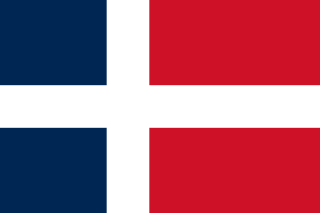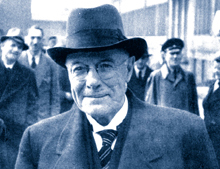Related Research Articles

Saarland is a state of Germany in the southwest of the country. With an area of 2,570 km2 (990 sq mi) and population of 990,509 in 2018, it is the smallest German state in area apart from the city-states of Berlin, Bremen, and Hamburg, and the smallest in population apart from Bremen. Saarbrücken is the state capital and largest city; other cities include Neunkirchen and Saarlouis. Saarland is mainly surrounded by the department of Moselle in France to the west and south and the neighboring state of Rhineland-Palatinate in Germany to the north and east; it also shares a small border about 8 kilometres long with the canton of Remich in Luxembourg to the northwest.

Saarlouis is a town in Saarland, Germany, capital of the district of Saarlouis. In 2020, the town had a population of 34,409. Saarlouis is located on the river Saar. It was built as a fortress in 1680 and was named after Louis XIV of France.

Otto Wels was a German politician who served as a member of the Reichstag from 1912 to 1933 and as the chairman of the Social Democratic Party (SPD) from 1919 until his death in 1939. He was military commander of Berlin in the turbulent early days of the German Revolution of 1918–1919, and during the 1920 Kapp Putsch he was instrumental in organizing the general strike that helped defeat the anti-republican putschists. Near the end of the Weimar Republic's life, however, he saw the futility of calling a general strike against the 1932 Prussian coup d'état because of the mass unemployment of the Great Depression.

The Saar Protectorate, officially Saarland, was a French protectorate and a disputed territory separated from Germany. On joining the Federal Republic of Germany in 1957, it became the smallest "federal state", the Saarland, not counting the "city states" of Berlin, Hamburg, and Bremen. It is named after the Saar River.

Homburg is a town in Saarland, Germany and the administrative seat of the Saarpfalz district. With a population of 43,029 inhabitants (2022), it is the third largest town in the state. The city offers over 30,000 workplaces. The medical department of the University of Saarland is situated here. The city is also home to the Karlsberg beer brewery. Major employers include Robert Bosch GmbH, Schaeffler Group and Michelin.

The Saar franc was the French franc used as the official currency of the Saar during the times that the Saar territory was economically split off from Germany, in 1920–1935 as the Territory of the Saar Basin, in 1947–1956 as the Saar Protectorate and 1957–1959 as the state of Saarland in West Germany. Local notes and coins were issued during both periods, but the Saar franc was never legally an independent currency.

The Free State of Prussia was one of the constituent states of Germany from 1918 to 1947. The successor to the Kingdom of Prussia after the defeat of the German Empire in World War I, it continued to be the dominant state in Germany during the Weimar Republic, as it had been during the empire, even though most of Germany's post-war territorial losses in Europe had come from its lands. It was home to the federal capital Berlin and had 62% of Germany's territory and 61% of its population. Prussia changed from the authoritarian state it had been in the past and became a parliamentary democracy under its 1920 constitution. During the Weimar period it was governed almost entirely by pro-democratic parties and proved more politically stable than the Republic itself. With only brief interruptions, the Social Democratic Party (SPD) provided the Minister President. Its Ministers of the Interior, also from the SPD, pushed republican reform of the administration and police, with the result that Prussia was considered a bulwark of democracy within the Weimar Republic.

The Territory of the Saar Basin was a region occupied and governed by the United Kingdom and France from 1920 to 1935 under a League of Nations mandate. It had its own flag : a blue, white, and black horizontal tricolour. The blue and white stood for Bavaria, and white and black for Prussia, out of whose lands the Saar Territory was formed. Initially, the occupation was under the auspices of the Treaty of Versailles. Its population in 1933 was 812,000, and its capital was Saarbrücken. The territory closely corresponds with the modern German state of Saarland, but was slightly smaller in area. After a plebiscite was held in 1935, it was returned to Germany.

The Greater Region, formerly also known as SaarLorLux, is a euroregion of eleven regional authorities located in four European states. The term has also been applied to cooperations of several of these authorities or of their subdivisions, administrations, organisations, clubs and people. Member regions represent different political structures: the Walloon region, comprising the French and German-speaking Communities of Belgium; the former Lorraine part of Grand Est, a region of France, including the French departments Meurthe-et-Moselle, Meuse, Moselle and Vosges; the German federated states of Rhineland-Palatinate and Saarland; and the sovereign state of Luxembourg.

Reinhard Klimmt is a German politician of the Social Democratic Party (SPD). From 1998 to 1999, he was Minister President of Saarland, and 1999–2000, Federal Minister of Transport, Building and Urban Affairs.
The politics of Saarland takes place within a framework of a federal parliamentary representative democratic republic, where the Federal Government of Germany exercises sovereign rights with certain powers reserved to the states of Germany including Saarland. The state has a multi-party system where the two main parties are the rightist Christian Democratic Union (CDU) and the leftist Social Democratic Party of Germany (SPD).

The Landtag of the Saarland is the state diet of the German federal state of Saarland. It convenes in Saarbrücken and currently consists of 51 members of five parties. The Social Democratic Party of Germany (SPD) is the largest party in the Landtag with 29 seats, an absolute majority that allows the party to govern without a coalition. The 2022 elections marked the first time that the SPD had won the state in 20 years.
Siegfried Aufhäuser was a German politician and union leader who was chairman of the white-collar General Federation of Free Employees (AfA-Bund) from 1921 until 1933.

The 2022 Saarland state election was held on 27 March 2022 to elect the 17th Landtag of Saarland. The outgoing government was a coalition of the Christian Democratic Union (CDU) and Social Democratic Party (SPD) led by Minister-President Tobias Hans.

Otto Niebergall was a German politician (KPD). During the twelve Nazi years, most of which he spent abroad, he was a resistance activist.

Hermann Röchling was a German steel manufacturer in the Saar (Germany) and Lorraine (France) in the 20th century. He was a paternalistic and well-liked employer, concerned about his workers' health and welfare. After World War I (1914–18) he was accused of the war crime of destroying French factories. Although he was acquitted, his French property was not returned, and he became deeply hostile to France. He was a Pan-German nationalist and strongly antisemitic. After the accession of Adolf Hitler he became an influential member of the Nazi Party. During World War II (1939–45) he was made responsible for coordination of the iron and steel industry in occupied Lorraine, and later in the whole of Germany and the occupied territories. He used prisoners of war for forced labor in the steel works. After the war he was tried and convicted for human rights violations, although as an old man he was released before serving his full term.

Alwin Brück was a German politician who was a member of the Social Democratic Party of Germany (SPD). He was Parliamentary Secretary of the Federal Ministry of Economic Cooperation and Development from 1974 to 1982.

Thomas Lutze is a German politician who represents the Social Democratic Party of Germany. Previously, he was a member of the Left Party. Thomas Lutze has served as a member of the Bundestag from the state of Saarland from 2009 to 2023, and has represented Berlin since October 2023.
References
- 1 2 Ursula Langkau-Alex (2004). Deutsche Volksfront 1932-1939: Zwischen Berlin, Paris, Prag und Moskau (in German). Berlin: Akademie Verlag. p. 148. ISBN 978-3-0500-4031-8.
- 1 2 3 4 5 6 7 8 9 10 11 12 13 14 15 16 17 18 19 20 21 22 Cf. Rainer Freyer, "Die Parteien im Saarland 1945-59", on: Saar-Nostalgie: Erinnerungen an frühere Zeiten im Saarland, retrieved on 20 February 2014.
- 1 2 3 4 5 6 7 8 9 10 11 12 13 Michael Sander, "Die Anfänge der Sozialdemokratie an der Saar", on: Solidarisch und stark. SPD-Landtagsfraktion, retrieved on 20 February 2014.
- 1 2 Cf. Paragraph 23, Chapter II, Annex to Article 45–50, Treaty of Versailles.
- ↑ Cf. Paragraphs 16–17, Chapter II, Annex to Article 45–50, Treaty of Versailles.
- ↑ Cf. Paragraph 18, Chapter II, Annex to Article 45–50, Treaty of Versailles.
- 1 2 Cf. Paragraph 26, Chapter II, Annex to Article 45–50, Treaty of Versailles.
- ↑ Cf. Amtsblatt der Regierungskommission des Saargebiets, 1922, p. 41.
- 1 2 3 4 5 Cf. "Unsere Geschichte: Nazi Deutschland", on: Homepage SPD Schwarzenholz, retrieved on 24 February 2014.
- 1 2 Gerd-Rainer Horn, European Socialists Respond to Fascism: Ideology, Activism and Contingency in the 1930s, New York City: Oxford University Press, 1996, p. 66. ISBN 978-0195093742
- 1 2 Gerd-Rainer Horn, European Socialists Respond to Fascism: Ideology, Activism and Contingency in the 1930s, New York City: Oxford University Press, 1996, p. 65. ISBN 978-0195093742
- ↑ Ursula Langkau-Alex, Deutsche Volksfront 1932-1939: Zwischen Berlin, Paris, Prag und Moskau], Berlin: Akademie, 2004. p. 152.